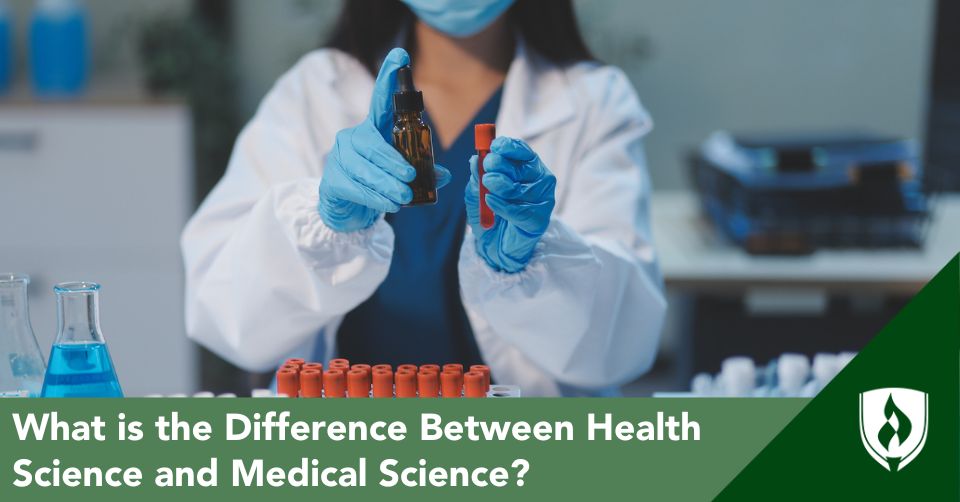
There are numerous ways to make a significant impact on people's lives. Two prominent paths are health science and medical science. Although they might seem similar at first, these disciplines differ in several key areas – educational pathways, focus areas, career opportunities and their overall impact on healthcare.
Understanding these differences can help you choose the path that aligns best with your interests and career goals. Whether you're passionate about improving healthcare as a whole or prefer the direct patient care involved in medical practice, find out which pathway will get you nearest to your goals.
Differences in education
In health science programs, students typically experience a more flexible and diverse educational path, with opportunities to explore various healthcare-related roles. This education can be in the form of associate's degrees, bachelor's degrees and even master's degrees--with many different roles in allied health careers and healthcare administration.
On the other hand, medical science education is far more specialized, focusing intensively on preparing students for clinical practice through a rigorous curriculum of medical knowledge, hands-on training, and patient care. This path requires a bachelor's degree, medical school and a residency period of training as well.
Typical time to complete health science education: 2-4 years
Health sciences include many different careers and areas of focus. Allied health roles like radiologic technologists, physical therapist assistants, pharmaceutical technicians, surgical technologists, medical assistants and more all come from health science programs.
Rasmussen University does not offer any certificate or degree programs in Medical Science.
But health sciences can also include managerial and administrative roles like healthcare administrators, medical office staff and public health policy professionals.
This multidisciplinary approach trains students to engage with various aspects of healthcare, including community health initiatives, shaping healthcare policies and managing health services.
Typical time to complete medical science education: 8-10 years
Medical science refers specifically to professionals who study medicine —physicians, surgeons, cardiologists, physical therapists, pharmacists, psychiatrists and more. Aspiring medical professionals typically undertake a lengthy journey, beginning with a medical degree, followed by several years of residency and possibly further specialization.
Their education covers a comprehensive range of subjects, including in-depth studies of anatomy, physiology, pharmacology, and clinical skills, aiming to ensure they are well-prepared for the complexities of medical practice.
This requires a longer educational journey, often spanning eight to ten years when considering medical school, residency and potential fellowship programs. Medical students typically dedicate years to classroom learning, clinical rotations and licensure exams before they can practice independently as physicians.
Medical professionals often specialize in specific fields such as cardiology, neurology, oncology, or pediatrics, dedicating their careers to understanding and addressing specific medical issues. These professionals conduct clinical trials, analyze patient data and collaborate with healthcare providers to improve treatment outcomes.
The intensive nature of medical training aims to ensure that healthcare providers are well-prepared to diagnose and treat a wide range of medical conditions with precision and empathy.
Check the specific education credential requirements needed for admission into medical schools and other advanced programs.
Differences in work environment
Health science professionals may work in various settings, including hospitals, government agencies and non-profit organizations. These professionals often work with an interdisciplinary team of healthcare professionals to address complex health issues. They collaborate with public health officials, policymakers, educators and community leaders to develop strategies that promote healthy behaviors and environments.
Medical science professionals may work in hospital settings, outpatient facilities, specialist facilities (like a cancer treatment center or psychiatric facility), research laboratories, clinics, pharmaceutical companies or academic institutions.
For instance, a medical scientist focused on oncology may study the genetic factors contributing to cancer development or test new chemotherapy drugs to improve patient survival rates. The field of medical science is constantly evolving with advancements in technology and research, leading to improved diagnostic tools and treatment options for various medical conditions.
Differences in career opportunities
Health science graduates typically have diverse career paths available to them. With a bachelor's degree, they are prepared to pursue administrative roles, technical roles, clinical roles or policy and advocacy roles.
Administration and advocacy careers
Health science graduates can be found in community health centers, government health departments, non-profit organizations and healthcare administration. These positions might involve coordinating health programs, overseeing initiatives to improve health and safety of the healthcare teams and educating communities or advocating for policy changes.
Additional education beyond a bachelor’s degree in health sciences or related work experience may be required to pursue a career in administration and advocacy.
Allied healthcare and clinical careers
These positions might involve caring for patients, designing and implementing health programs, conducting vital public health research, and educating communities on health practices.
Additional education beyond a bachelor’s degree in health sciences or related work experience may be required to pursue an allied health career.
Health informatics careers
The intersection of health science and technology has also opened up new career paths in health informatics. Health informaticians utilize data analysis and technology to improve healthcare delivery and patient outcomes. They play a crucial role in managing electronic health records, implementing health information systems and ensuring data security and privacy compliance.
Health science graduates who like technology might find career opportunities in this critical sector of the healthcare world. Additional education beyond a bachelor’s degree in health sciences or related work experience may be required to pursue a career in health informatics.
Medical careers
Medical science careers are primarily clinical with some options for research roles.
Doctors often work in hospitals, clinics, research institutions or private practices. They might practice as general practitioners or opt to specialize in areas like surgery, radiology or psychiatry, focusing on diagnosing and treating medical conditions.
Medical professionals might also work in research labs or as consultants or educators as they progress in their careers.
Differences in specialization options
Health science is a very broad field. Here are just some examples of careers graduates of health science programs choose.
Specializations in health science
- Pharmaceutical technician
- Radiologic technologist
- Surgical technologist
- Physical therapist assistant
- Cardiographer
- Hospital administrator
- Clinical director
- Health services manager
- Practice manager
- Medical assistant
- Medical administrative assistant
- Medical billing and coding specialist
- Dental assistant
- Occupational therapy assistant
- Medical lab technician
- Health information technician
It's also worth noting that most specializations in medicine also include roles for technicians and assistants who are interested in that specific area.
Rasmussen University does not offer any certificate or degree programs that will lead to these career opportunities: Cardiographer, Dental Assistant, and Occupational Therapy Assistant.
Specializations in medicine
Medical specialties tend to either focus on a population, a malady or a specific area of the body. Here's an example of some of the medical areas you could focus on.
- Pediatrics
- Surgery
- Anesthesiology
- Family medicine
- Neurology
- Emergency medicine
- Dermatology
- Cardiology
- Obstetrics and gynecology
- Psychiatry
- Orthopedics
- Immunology
- Ophthalmology
- Urology
- Physical therapy
- Oncology
- Radiology
- Nuclear medicine
- Hematology
- Intensive care medicine
- General surgery
- Geriatrics
- Neurosurgery
- Dentistry
- Infectious diseases
- Neonatology
Rasmussen University does not offer any degree programs that will lead to ANY of the above career opportunities that involve specializations in medicine.
Differences in scope of research
Research and development play crucial roles in advancing both health science and medical science. In the field of health science, research often focuses on understanding the impact of various factors on public health and devising strategies to improve population health outcomes.
This can include studying the effectiveness of health programs, analyzing health-related data, or conducting surveys and interviews to gather insights.
Research and development roles in health science also involve exploring the social determinants of health, such as socioeconomic status, education, and environmental factors. By understanding how these factors influence health outcomes, researchers can develop targeted interventions to address health disparities and improve overall well-being in communities. It is important to check the education credential (s) and/ or work experience that is required to pursue occupations that involve research in the field of Health Sciences.
Medical researchers often work in laboratories or research institutions, carrying out experiments, analyzing data and testing new medications or medical devices. Their findings contribute to the development of new treatment options, solutions for diseases and advancements in medical technology.
Similarly, in the realm of medical science, research and development efforts extend to studying the genetic and molecular mechanisms underlying diseases. This involves investigating how individual genetic variations impact disease susceptibility and response to treatments, leading to more tailored and effective healthcare strategies for patients.
The WIDE world of healthcare and medicine
As you can see, health science and medical science are huge industries and areas of study. But they are both important to the health and wellness of all people. If you want to work in one of these areas, the world needs you!
What appeals to you more, health science or medical science? Which direction makes more sense for your career goals?
If you like the options you can find under the health science umbrella, check out What Can You Do with a Health Sciences Degree? for a closer look at where the degree can take you.




